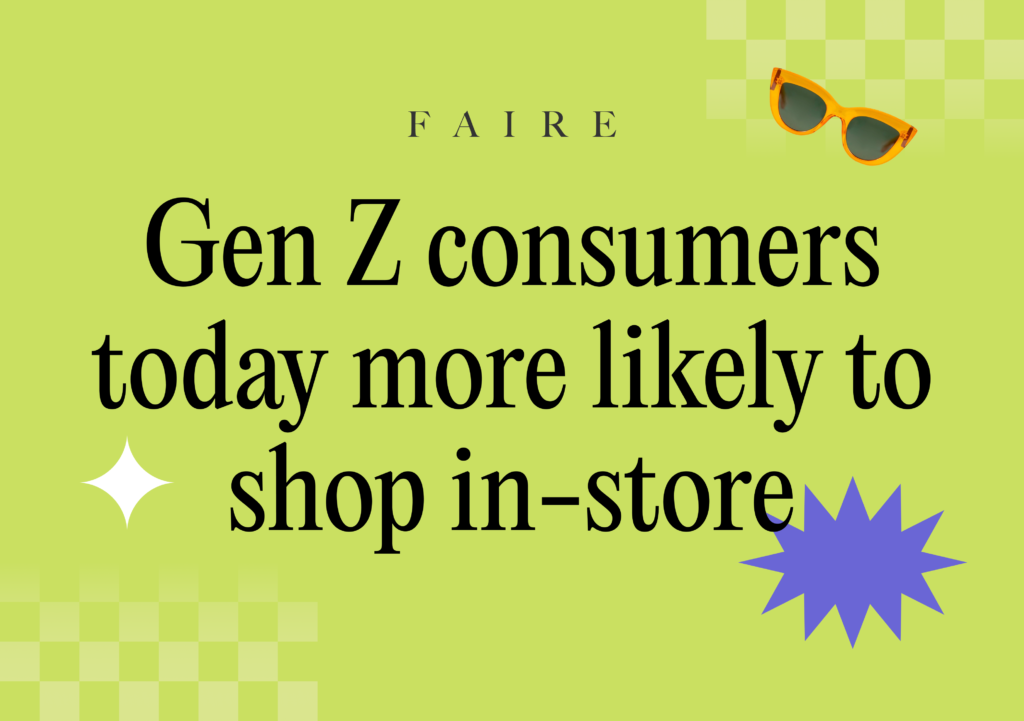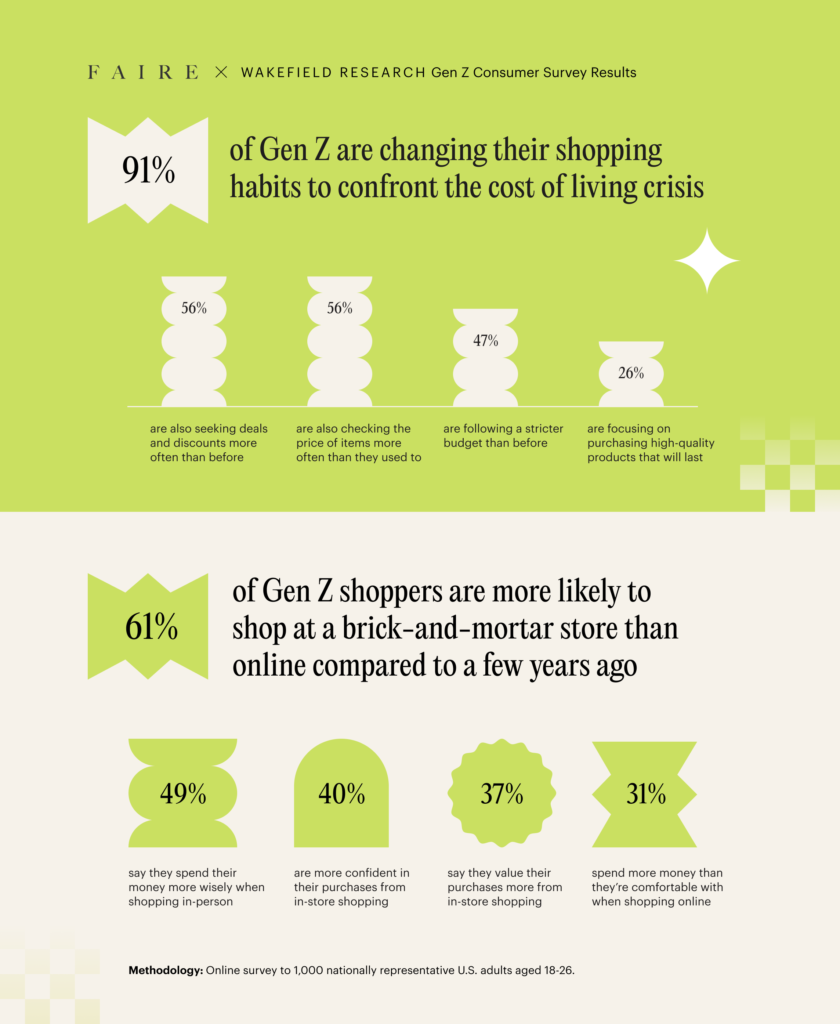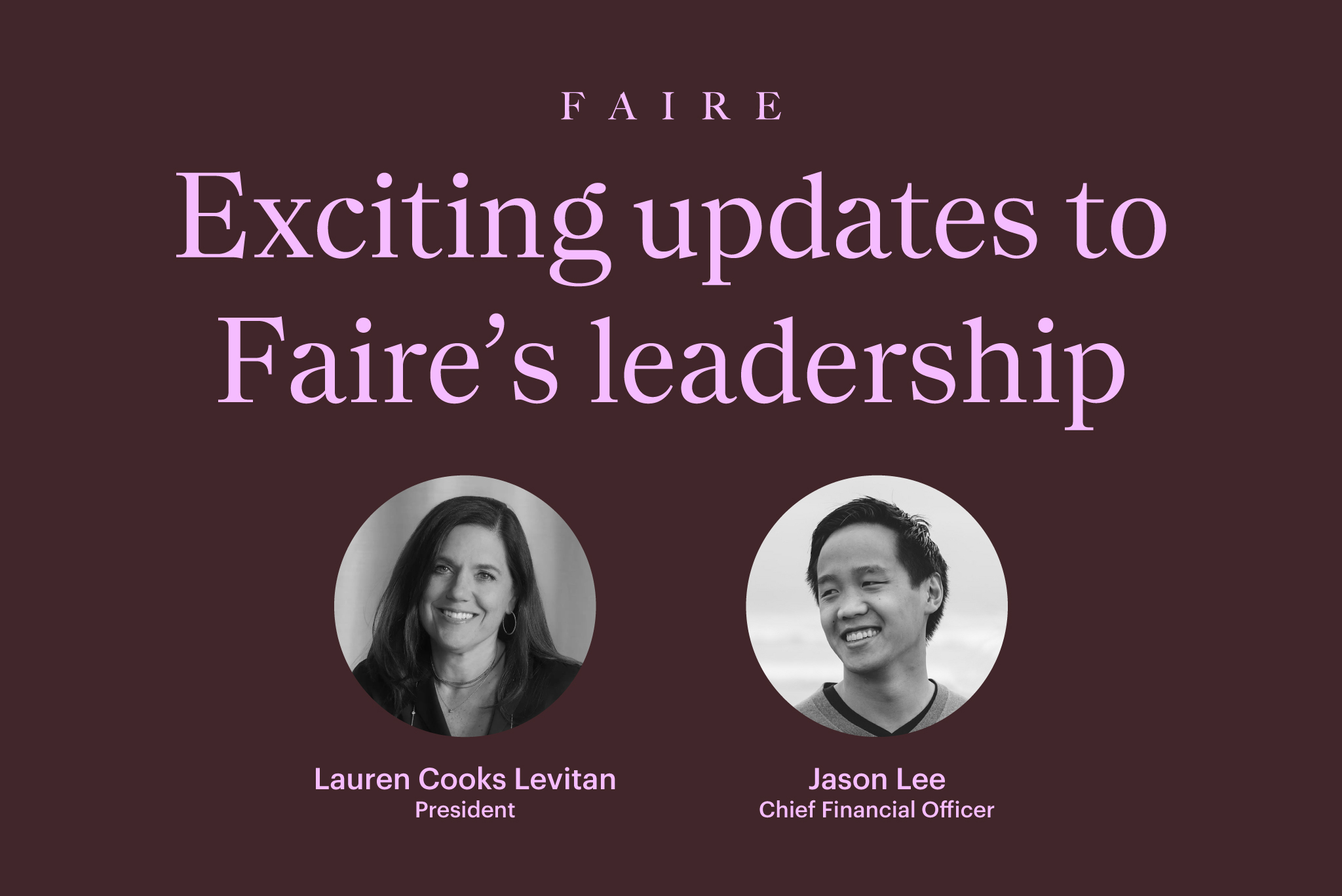Faire Survey Reveals Majority of Gen Z More Likely to Shop In-Store Than Online Compared to a Few Years Ago
October 4, 2023 | By Faire

New research commissioned by Faire, the largest wholesale marketplace used by hundreds of thousands of independent retailers around the world, found that Gen Z consumers today are shopping in a way that is counterintuitive to their digitally-native reputation.
With an estimated $360 billion of disposable income that will accelerate in the coming decade as the younger cohort reaches financial maturity, Gen Z consumers have become a central focus for the retail industry. Surprisingly, Faire’s research shows that the world’s first digital generation has an increased preference towards the more traditional format of in-store shopping. In a survey of 1,000 U.S. consumers ages 18-26 conducted by Wakefield Research on behalf of Faire, 61% of Gen Z adults reported they are more likely to shop in-person than online compared to a few years ago.
Financial incentives for in-store shopping
For the first generation that has entered the workforce amid a global pandemic followed by mass layoffs, a war, and the cost of living crisis – the circumstances in which Gen Z came into their financial spending power has affected what they spend and how they spend. According to Faire’s survey, over 90% reported the rising cost of living has impacted how they shop, 56% are seeking deals and discounts and checking the price of items more often than before, and nearly 50% are following a stricter budget.
The results also reveal why in-store shopping may be so increasingly appealing for this generation coming-of-age in crisis – it helps them be more discerning shoppers as they manage tightened budgets. According to Faire’s survey, half of Gen Z adults spend more wisely when shopping in-person, 40% say they are more confident in purchases made in-store, 3 in 4 admit to buying things online that they don’t need simply because it is easy to purchase, and a third spend more money than they’re comfortable with when shopping online.
“Gen Z shoppers have consistently led the charge against monolithic consumerism. They purchase based on their values and prioritize sustainability more than any other generation,” said Faire CFO, Lauren Cooks Levitan. “Shopping in-store makes it easy for them to keep those same principles, and be more fiscally responsible during this difficult economic period. This leads to an overall more meaningful shopping experience than they are able to find online.”
Hunger for brick-and-mortar experiences
Despite worst case predictions for brick-and-mortar post-pandemic, the ritual of in-person shopping is alive and well, and according to research from CM Group Gen Z are the most likely to seek out brick-and-mortar shopping, with 47% preferring to shop in-store, more than any other group.
In addition to its monetary effects, entering adulthood amid a crisis prompts emotional changes and shifts in shopping motivation. Research has shown that nostalgia is particularly potent during times of crisis. For Gen Z, the so-called loneliest generation, offline experiences feed their hunger to be social, and the nostalgic quest for meaning and connection post-pandemic. According to Faire’s survey, 34% of Gen Z make a full day of it when they shop in-person, and 32% prefer to shop in person because they’d rather be with their friends and not shop alone.
“Younger generations have long gravitated to in-person shopping experiences for community, self-expression, and the joys of real-life discovery. This was once centralized around malls, but now boutiques and independent retailers — from home accessory concept stores to third wave coffee shops — have become gathering hubs. Gen Z is, sadly, a generation that’s proving prone to loneliness and isolation, often driven by technology. But they are also highly individualistic. It makes perfect sense that they see brick and mortar boutiques and independent retail as modern outlets for connection and experimentation,” said Kirsten Green, Founder and Managing Partner of Forerunner Ventures.
E-commerce as the new showroom
While online continues to be a shopping destination for Gen Z, e-commerce plays a very specific role. Its quick and anonymous framing makes it the obvious choice for purchases led by necessity. For shopping motivated by enjoyment however, 41% of Gen Z say they gather inspiration by browsing online, despite mostly not executing or completing their purchase there.
This further supports how Gen Z consumers are becoming more discerning shoppers, focused on extensive “search and discovery” phases before they commit to spending. In fact, data from consumer investment firm Forerunner Ventures, revealed that three quarters of Gen Z consumers reported spending between a few hours and a few days researching an item before buying. This hesitancy to execute online is seemingly at least partly due to the fact that online shopping doesn’t guarantee quality. According to the Faire survey, 43% of Gen Z have returned part of an online shopping order due to quality issues, and 52% tend to shop online from retailers they already know and trust.
Gen Z shopping plans this holiday season
Overall, these distinct differences towards offline and online channels will affect how Gen Z shops this year and beyond, with more preferences towards offline channels than expected from the smartphone generation. According to the Faire survey, the majority of Gen Z adults plan to shop for gifts with a combination of online and brick-and-mortar retailers this holiday season. Additionally, nearly a quarter plan to shop mostly in-store, and 20% plan to find inspiration online and then purchase in-store.
In the next 10-15 years, as more members of this generation enter adulthood and financial maturity, their shopping habits will increasingly shape brick-and-mortar and online retail. For more context on Gen Z’s shopping habits, download Faire’s research report: How Gen Z Shops: The Evolving Blend of IRL and URL Retail.
Faire survey methodology
The Faire Survey was conducted by Wakefield Research among 1,000 nationally representative US adults ages 18 to 26 between August 3rd and August 9th, 2023, using an email invitation and an online survey. Data has been weighted. Results of any sample are subject to sampling variation. The magnitude of the variation is measurable and is affected by the number of interviews and the level of the percentages expressing the results. For the interviews conducted in this particular study, the chances are 95 in 100 that a survey result does not vary, plus or minus, by more than 3.1 percentage points from the result that would be obtained if interviews had been conducted with all persons in the universe represented by the sample.
Forerunner survey methodology
This survey was designed by Forerunner and conducted online June 29-30, 2023 among 524 adults ages 18-27 living in the United States.




